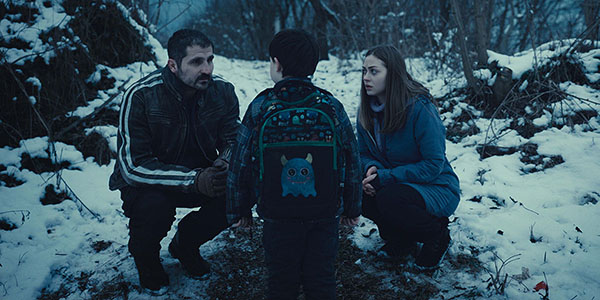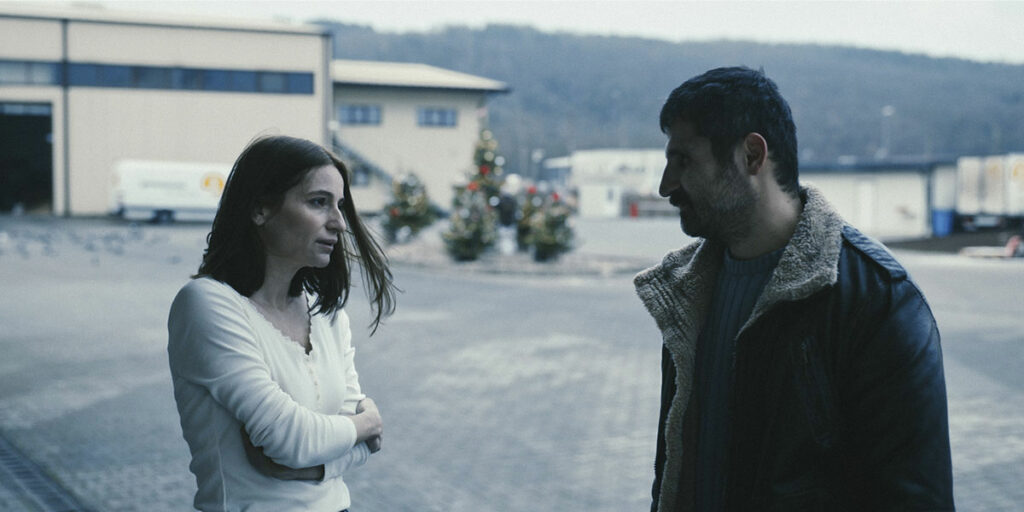With R.M.N., Cristian Mungiu presents the harsh reality of European xenophobia through a gloomy atmosphere, excellent performances, and a staggering seventeen-minute-long scene.
Cristian Mungiu, who I think is a brilliant filmmaker, takes a while crafting his features. He doesn’t feel the need to produce stories left to right, choosing to focus on one story at a time for an extended period. And each time around, it shows that his pure focus is centered on detailing each layer his narratives contain – from the minutiae to the atmosphere. You can sense the heavy contemplation in each of his features. The heaviness of the story is matched with the precise and intelligent filmmaking of Mungiu to create a piece of work that leads to plenty of conversations. Most of his films deal with tough topics that relate to the current state of society and have a further impact due to events centering on the respective themes. The timing in which Mungiu decides to make his films is fascinating.
Mungiu first pierced the screen with the Palme d’Or-winning 4 Months, 3 Weeks, and 2 Days back in 2007, and through the years followed it with brilliant films like Beyond the Hills (2012) and Graduation (2016). Although none of his movies have matched the Cannes top-prize winner, Mungiu is still a force to be reckoned with, the top filmmaker of the Romanian New Wave. Six years after delivering his last feature, Mungiu is back with R.M.N. (titled after the local acronym for an MRI, rezonanta magnetica nucleara), a film that explores European xenophobia – the dislike of or prejudice against people from other countries and ethnocentrism – via an ominous and gloomy atmosphere. The MRI brain scan is a metaphor that contrasts with the health of the main character’s father. As it deteriorates, the villager’s way of thinking gets fueled with anger and discrimination – their racial, colonial, and political conflicts.
The Transylvanian townsfolk in R.M.N., a multi-ethnic community (German, Romanian, Hungarian), are not comfortable with strangers but supportive of each other. Like the blue-hued color-grading in the film, it feels as if something in the air is poisoning the minds of plenty of the people there; it is somber but not melancholic. Due to the number of ethnicities in the town and the various languages spoken, there’s co-existence. However, amidst that so-called “co-existence”, there’s redundancy via hostility, loathing, and uneasiness against the people that aren’t their own. That’s the background of Mungiu’s latest, and its backbone is the portrayal of these people who think in that hateful and racist way. This portrayal of xenophobia by Mungiu is tragically relatable, as plenty of people around the world have this ignorant and hostile mentality. Mungiu’s latest sets itself on an unnamed Transylvanian town in Romania, amidst the snow-covered forests and mountains, a few days before Christmas.

The film centers around a man named Matthias (Marin Grigore), who has recently quit his job as a sheep farmer in Germany and has returned home. It begins with his arrival, wishing to be involved in the education of his eight-year-old son, Rudi (Mark Blenyesi), after being in the care of his mother, Ana (Macrina Bârlădeanu, whose subtle performance elevates the film’s dynamics), for such a long time. What is the purpose of Matthias’s education? To rid his son of the unresolved fears, apprehensions, and passive nature (which he sees as a big issue), that has taken hold of him while he has been gone. Ana is supportive: she lets Rudi sleep in her bed when he’s frightened and teaches him to crochet. Matthias thinks these things are making him “less of a man,” which is also noticeable when he says, “People who feel pity die first”. Things take a further left turn once his ex-lover, Csilla (Judith State), with whom he’s obsessed, hires new staff from Sri Lanka for her bakery – causing the racism of the local community to show up.
There is a separation from the townsfolk in a moment that is supposed to be about celebration and togetherness; hatred and hostility emerge, and they are disturbed. Although there are glimpses of aggression at the beginning of the film, when Matthias breaks a co-worker’s nose out of a violent outburst (later causing his return home), Csilla’s hiring causes a deeper concentration of abhorrence. Through a combination of a silent yet gloomy atmosphere and brutal moments that are pretty startling because of their genuinely humanistic nature, Mungiu examines the hypocrisy of the villagers experiencing such prejudice elsewhere – they encounter similar situations abroad. It is very effective and piercing throughout the film’s entirety, even if Mungiu repeats his main point on several occasions. It makes the viewer think about the mentalities of where we live, if they have their own discriminations or execrations. Even if it isn’t to the same extent as the events presented in R.M.N., it is still heartbreaking that things haven’t changed.
It feels as if Mungiu wants everybody who watches to look in the mirror and think about what has been presented, especially with its riddled ending that recalls a motif in R.M.N., which was to look out for bears. There are no easy answers, and Mungiu isn’t going to tell us the precise meaning behind the film. Instead, he wants us to ponder its meaning and see what we come up with. R.M.N. could be interpreted in various forms, and had me thinking the entire night about its possibilities. After hours of thinking, I came up with the idea that the humans and the bears represent the villagers and the immigrants respectively, intertwined with Matthias’ anger after losing his father, which later translates to aggression – presented in the form of the Chekhov’s gun, the rifle presented in the first act. There’s more to be expanded upon; the subconscious versus consciousness, the mob mentality, and the deteriorating mind caused by aging, grief, and hatred.
That’s why Mungiu’s latest is so fascinating; the way it shows the intricate web of human affinities, even if it may be centered around a brume of disdain, is richly multi-layered. There’s one lengthy scene in the film’s last act, a seventeen-minute long take, of a town hall meeting that will have plenty of people talking about it due to its impact and tension, as well as its finer details seen in the background (the facial expressions, mannerisms, behavior, speaking tone, etc). In that scene, the villagers talk about whether or not the immigrants Scilla hired should be forced to live in another country. Although the rest of the film is excellently crafted, this is its crux. This is where you see Mungiu excel the most – his script pierces you because he’s showing a harsh reality that there are still people in many places worldwide with hate in their hearts.
R.M.N. may not be better than 4 Months, 3 Weeks, and 2 Days, but it is yet another feature in which Mungiu captures the evil and paranoia in humanity at a time when we are seeing such acts taking place over and over again, with little to no change.
R.M.N. premiered at TIFF on September 10, 2022 and was released in US theaters by IFC Films on April 28, 2023. In the UK, the film will be out on Blu-Ray and digital platforms on January 22, 2024.

